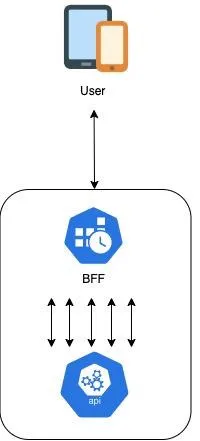
How Marmelab Transformed Accor's IT Architecture to Boost Revenue and Customer Experience

Accor, the largest hotel group in Europe, approached us to assist in resolving delivery and performance issues with their mobile app development. This article will explain how we tackled their intricate IT architecture, the problems we discovered, and the solutions we implemented.
Process
Our initial step was to audit the technical architecture that underpins the mobile applications. Over a span of 10 days, we met with 26 team members (developers, architects, product owners and managers) to comprehend their business, organization, and technical challenges.
We discovered how these challenges had influenced the IT architecture. We paid special attention to how Accor’s data (hotels, reservations, customers, etc.) was being used by numerous applications and partners, each with its own restrictions. This API-centric architecture was both a strength and a liability.
Identified Problems
Accor operates a central API that provides all business data to stakeholders through a REST API. The API is structured according to Accor’s business model (one route for hotels, another for reservations, etc.). However, this generic model clashed with the specific needs of mobile apps, where each page should make at most one request to an API. This discrepancy caused several issues, such as poor performance for mobile device users and high development costs.
Solution
To tackle these problems, we suggested incorporating an intermediary server between the Accor API and the mobile apps. This “Backend for Frontend” (BFF) aggregates and limits API calls, thus eliminating the need for duplicating code in the mobile apps.

Developed with GraphQL, a query language for complex APIs, the BFF gave more autonomy for the mobile development without altering the underlying REST APIs. For each page, mobile apps only need to make a single query to the BFF. While this might result in several REST API calls, they all occur within Accor’s datacenters, ensuring optimal perceived performance.
Marmelab developed the BFF using the following technologies:
- Node.js
- Apollo Server
- TypeScript
- Amazon Web Services
The mobile development team assumed responsibility for maintaining and extending the BFF. This enabled them to promptly add mobile-specific routes, without cluttering the generic REST API. Among these features, we developed a service to manage the news displayed on the mobile apps’ landing page. The backend for this service utilized the following technologies:
- PostgreSQL
- PostgREST
- React-admin
We developed the BFF incrementally, delivering an initial version within weeks to allow mobile developers to validate the performance improvements. This agile product approach, inspired by the Lean Startup methodology, helped identify and rectify design problems early. We completed the BFF within a few months, and Accor began using this API in production soon after.
Outcome and Benefits
A few months after completing our project, Accor shared several technical, user, and business metrics that highlighted a significant turning point upon the deployment of the BFF.
User ratings and customer satisfaction saw concurrent increases. User benefits included:
- Decreased wait times for server response
- Improved result consistency
- No layout shifts (as all data for a page could be loaded simultaneously)
From a technical perspective, the development of new features for mobile became significantly more cost-effective, and the time-to-market was reduced. It also encouraged more experimentation and facilitated the addition of long-requested features, such as Accor Loyalty cards in the iOS Wallet.
These changes resulted in considerable business benefits, specifically:
- Increased revenue generated from the mobile app
- Decreased development costs
The benefits realized within six months already amounted to hundreds of thousands of euros.
But it doesn’t end there! Based on these remarkable results, Accor is committed to maintaining and further developing the BFF in the future.
Conclusion
Thanks to our agile and collaborative approach, starting with an initial technical audit, we were able to propose innovative as well as tailor-made solutions. We realised rapid development and early validation through iterative improvements based on feedback from the field. In the end, our solutions fitted seamlessly into Accor’s vision and resulted in Accor’s IT infrastructure becoming more cost-effective and efficient.
Do you have an innovative project that could use some assistance? Let’s tackle it together!
Authors

Marketing Manager, Caroline works to increase the visibility of Marmelab and the products we publish, especially react-admin and Atomic CRM. She has many talents: avoid challenging her at foosball!